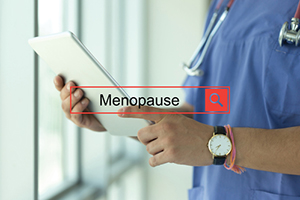 If you are a woman in your middle age and you suspect your sleep has gotten worse. . .
If you are a woman in your middle age and you suspect your sleep has gotten worse. . .
Or as a husband, the woman in your life suddenly drives you crazy with her inability to sleep. . .
. . .a new study now explains why this happens and how to deal with it.
It is sometimes hard for women to avoid the conclusion that they have gotten a raw deal in life compared to men, and this sleep issue is another fact to add to the long list of why that may be true.
When women pass from their reproductive to their post-reproductive years, they go through a period during which their ovaries produce gradually decreasing amounts of the hormones estrogen, progesterone, and testosterone.
During this time, the levels of these hormones fluctuate wildly, giving rise to all the unpleasant menopausal symptoms with which we women are familiar.
Dr. Colleen Ciano presented a study on the relationship between menopause and sleep at the 2016 annual meeting of the North American Menopause Society.
At this stage it has not yet been published, but it does follow up on a similar, but less detailed, study she presented at the same venue in 2015.
She was interested not only in the rate and severity of insomnia during this period, but also in the impact that different menopausal stages have on insomnia.
Like other medical scientists, she divided the whole experience into perimenopause and menopause.
Perimenopause refers to the period leading up to the last menstrual period and the 12 months subsequent to it; menopause is the stage that begins 12 months after the last menstrual period.
Dr. Ciano analyzed 10 years of data collected from the Study of Women’s Health Across the Nation (SWAN) and found the following:
1. Overall, 31 to 42 percent of women experience insomnia symptoms during perimenopause and menopause. These include difficulty falling asleep, problems staying asleep, and poor sleep quality.
2. The later the stage, the greater the risk you will sleep poorly. In the earliest stage of perimenopause, women are 0.82 times less likely to suffer from insomnia than those in late menopause or post-menopause.
3. The risk of insomnia is the greatest in women whose menopause is brought about by surgery. They are 0.7 times more likely to sleep poorly than those who naturally progress from early perimenopause to menopause.
This is important not only because it provides another reason why surgery should be a last resort, but also so that women can know what to expect as they progress through the whole experience, and so that physicians can know how to guide them through it.
In addition, earlier this year we reported on two studies performed at the University of California at Los Angeles that show that, when combined with insomnia, menopause speeds up the rate at which women’s biological clock ticks, literally aging them faster.
One of these studies found that postmenopausal insomniacs were biologically about two years older than good sleepers of the same age.
The new study is further confirmation that you must deal with the worsening insomnia as you proceed through the stages of your menopause.
Here is a simple technique that helps almost everyone to fall into a deep sleep in 10 minutes…

 Multiple Sclerosis
Multiple Sclerosis Banishing Bronchitis
Banishing Bronchitis Gum Disease Gone
Gum Disease Gone Overcoming Onychomycosis
Overcoming Onychomycosis Neuropathy No More
Neuropathy No More The Prostate Protocol
The Prostate Protocol Brain Booster
Brain Booster
 Ironbound
Ironbound
 Solution for Shingles
Solution for Shingles
 The Bone Density Solution
The Bone Density Solution
 The Ultimate Healing Protocol
The Ultimate Healing Protocol
 The Parkinson's Protocol
The Parkinson's Protocol
 The Chronic Kidney Disease Solution
The Chronic Kidney Disease Solution
 Overthrowing Anxiety
Overthrowing Anxiety The Fatty Liver Solution
The Fatty Liver Solution The Hypothyroidism Solution
The Hypothyroidism Solution
 The End of Gout
The End of Gout The Blood Pressure Program
The Blood Pressure Program
 The Oxigized Cholesterol Strategy
The Oxigized Cholesterol Strategy
 Stop Snoring And Sleep Apnea Program
Stop Snoring And Sleep Apnea Program
 The Arthritis Strategy
The Arthritis Strategy The Vertigo & Dizziness Program
The Vertigo & Dizziness Program The 3-Step Diabetes Strategy
The 3-Step Diabetes Strategy Hemorrhoids Healing Protocol
Hemorrhoids Healing Protocol The Erectile Dysfunction Master
The Erectile Dysfunction Master Weight Loss Breeze
Weight Loss Breeze The IBS Program
The IBS Program The Insomnia Program
The Insomnia Program The Migraine and Headache Program
The Migraine and Headache Program The Neck Pain Solution
The Neck Pain Solution The Menopause Solution
The Menopause Solution The Ejaculation Master
The Ejaculation Master The TMJ Solution
The TMJ Solution The Acid Reflux Solution
The Acid Reflux Solution The Fibromyalgia Solution
The Fibromyalgia Solution The Psoriasis Strategy
The Psoriasis Strategy